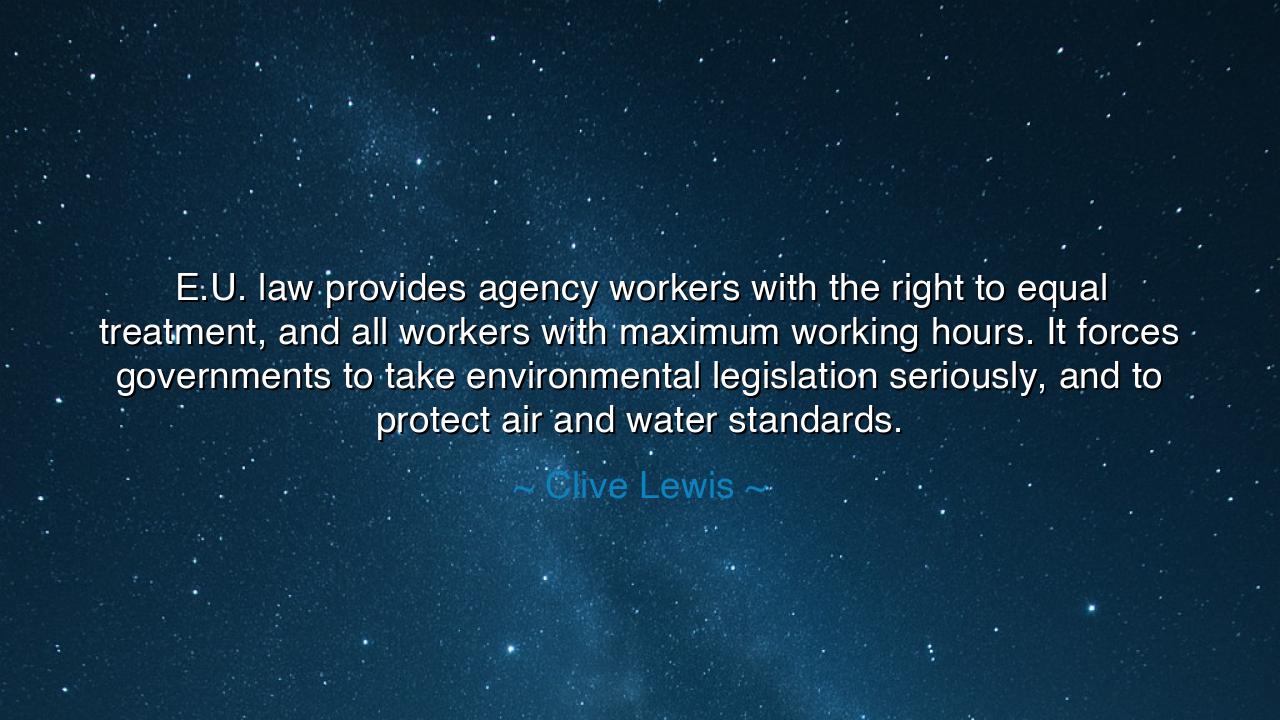
E.U. law provides agency workers with the right to equal
E.U. law provides agency workers with the right to equal treatment, and all workers with maximum working hours. It forces governments to take environmental legislation seriously, and to protect air and water standards.






Hear the words of Clive Lewis, spoken in defense of justice and stewardship: “E.U. law provides agency workers with the right to equal treatment, and all workers with maximum working hours. It forces governments to take environmental legislation seriously, and to protect air and water standards.” In these words we hear both a hymn to human dignity and a summons to guard creation itself. He speaks not merely of statutes written in courts and councils, but of principles as old as the cry for fairness and as enduring as the rivers and skies.
When Lewis names the rights of agency workers to equal treatment, he speaks for the many who labor in temporary or insecure positions, too often denied the protections given to others. His words remind us that the measure of a society is not how it treats the powerful, but how it shields the vulnerable. To grant equal treatment is to recognize that the dignity of labor belongs not only to the permanent, the privileged, or the secure, but to all who give their strength to the work of the day.
He declares also that all workers must have maximum working hours. This principle, born from the struggles of generations, protects the human body and spirit from being consumed by endless toil. For history is heavy with tales of men and women crushed beneath the wheels of industry, laboring fourteen, sixteen hours a day until their health and hope withered away. The law stands now as a shield, reminding us that life is not only for labor but also for rest, for family, and for the soul’s renewal.
Lewis extends this vision beyond the rights of workers to the health of the earth itself, saying that E.U. law forces governments to protect air and water. Here the teaching grows vast, for no man lives by bread alone, but by the breath of the air and the purity of the waters. To pollute them is to poison ourselves, to trade temporary wealth for enduring ruin. His words recall the ancient truth that humanity is not master of the earth, but steward—charged with guarding the resources that sustain every generation.
History gives us a warning in the tale of the Great Smog of London in 1952. For four days, coal smoke filled the city until thousands perished from the choking air. Out of this calamity arose new laws and greater care for the environment, proving that when governments ignore air and water, disaster follows swiftly. Lewis’s words echo this lesson: that environmental protection is not luxury, but necessity; not charity, but survival.
The meaning of this quote is thus twofold: it is both social and environmental justice. It binds together the dignity of the worker and the sanctity of the earth, reminding us that laws are not only for order but for flourishing. A law that protects the weak is a foundation of freedom; a law that safeguards the land is a covenant with the future. Together they form the pillars of a civilization that honors both its people and its planet.
Children of tomorrow, let this teaching be etched upon your hearts: fight for fairness wherever you see inequality, and stand vigilant in the defense of the earth. Do not allow workers to be stripped of dignity, nor rivers to be drained of life. In your own lives, value rest as you value labor, consume with responsibility, and raise your voice for leaders who protect both people and planet.
Thus the wisdom of Clive Lewis’s words endures: that law must be the guardian of humanity and of nature. Equal treatment for workers, protection of air and water—these are not small matters, but the lifeblood of justice. Remember always that a society unwilling to defend its people and its environment cannot endure, but one that cherishes both may flourish for generations to come.






AAdministratorAdministrator
Welcome, honored guests. Please leave a comment, we will respond soon